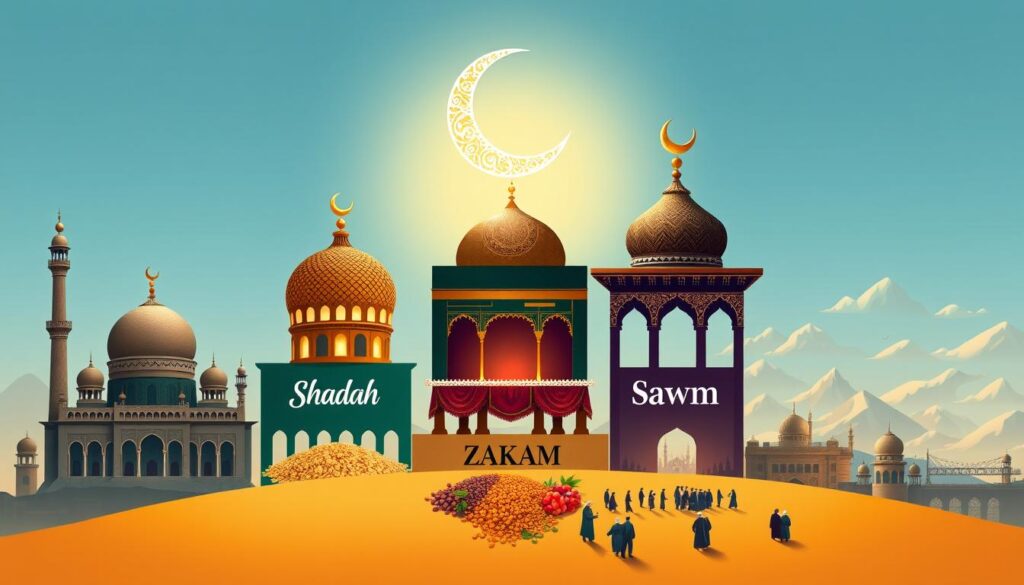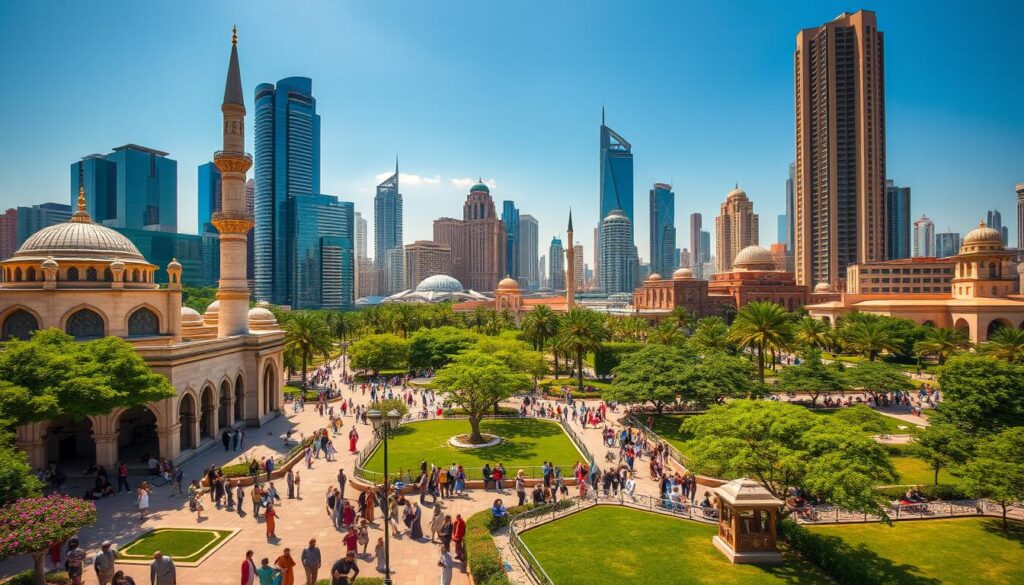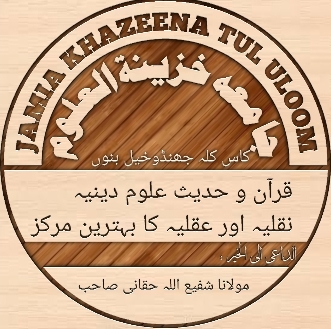Islam is a major world religion, known for its rich history, diverse cultures, and deep teachings. These have influenced billions globally. This guide aims to give you a detailed look at the Islamic faith, its beliefs, practices, and its significant impact worldwide.
At its heart, Islam is a lifestyle that focuses on God’s oneness, spiritual devotion, and ethical living. It guides believers through the Quran and the Prophet Muhammad’s teachings. This framework helps in personal and social growth, aiming for spiritual enlightenment and moral excellence.
If you’re new to Islam or want to learn more, this introduction will take you on a journey. You’ll explore Islamic beliefs, practices, and history. From the religion’s pillars to the varied cultures of Muslim communities, this guide offers a deep and broad view of Islam.
Key Takeaways
- Discover the core beliefs and principles of the Islamic faith.
- Explore the sacred texts of Islam, including the Quran and the Sunnah.
- Gain insights into the historical development and spread of Islam.
- Understand the diversity of Muslim cultures and their unique traditions.
- Examine the ethical and social teachings of Islam and their relevance in the modern world.
- Dispel common misconceptions and stereotypes about Islam and Muslims.
- Appreciate the profound influence of Islam on various aspects of human civilization.
What is Islam?
Islam is a monotheistic Abrahamic religion that has captivated the hearts and minds of billions across the globe. At its core, Islam is a way of life that encompasses a profound belief in the oneness of God, known as Allah. It also involves a deep commitment to spiritual, social, and personal fulfillment.
The Meaning and Roots of Islam
The word “Islam” comes from the Arabic root “s-l-m,” which means “submission” or “surrender.” This reflects the central tenet of this faith, which is to submit to the will of the Almighty. The religion’s origins trace back to the 7th century CE in the Arabian Peninsula. It was there that the Prophet Muhammad received the divine revelations that form the basis of the Quran, the holy scripture of Islam.
Islam as a Way of Life
Islam is not just a set of beliefs or rituals; it’s a comprehensive way of life. It guides followers in all aspects of their existence. From ethical principles to social responsibilities, Islam provides a holistic framework for personal and communal well-being. It emphasizes harmony, justice, and the pursuit of knowledge.
Through its teachings, Islam encourages adherents to cultivate a deep sense of spirituality. It also highlights the importance of maintaining strong family bonds, contributing to the community, and striving for personal and professional excellence. This balanced approach to life has made Islam a deeply revered and influential religion worldwide.
“Islam is not merely a set of beliefs or a collection of rituals; it is a comprehensive way of life that guides its followers in all aspects of their existence.”
A comprehensive introduction to Islam
Islam has captivated hearts and minds worldwide. It is a major faith with a rich history, profound beliefs, and a vibrant culture. This introduction will explore Islam’s core tenets, its origins, key principles, and how it shapes the lives of its followers.
At its heart, Islam is a monotheistic faith emphasizing God’s oneness, known as Allah. Muslims believe in the Quran, their holy scripture, and the teachings of the Prophet Muhammad. These form the Islamic faith’s foundation.
Islam emphasizes a holistic life. Muslims integrate their faith into all aspects of life, from daily routines to major events. The five pillars of Islam reflect this integration:
- The declaration of faith (Shahada)
- The performance of ritual prayers (Salat)
- The payment of alms (Zakat)
- Fasting during Ramadan (Sawm)
- The pilgrimage to Mecca (Hajj)
These pillars guide Muslims in their spiritual and social lives, fostering devotion to God.
Beyond core beliefs, Islam has a rich cultural heritage. It includes diverse traditions, art, architecture, and literature. The intricate calligraphy in mosques and the recitation of the Quran showcase the creativity and reverence of Muslims.
This introduction aims to provide a solid foundation for understanding Islam. By exploring its history, beliefs, and culture, we can appreciate Islam’s diversity and significance globally.
The Quran and Sunnah
At the heart of Islam lies the quran and sunnah, the divine revelation and the teachings of the Prophet Muhammad. These two pillars serve as the primary sources of guidance and inspiration for the faithful. They shape their beliefs, practices, and way of life.
The Divine Revelation of the Quran
The quran is the central religious text of Islam, believed to be the word of God revealed to the Prophet Muhammad through the angel Gabriel. Muslims consider the quran to be the perfect and final revelation. It is a timeless guide that encompasses all aspects of life. This divine revelation is revered for its profound spiritual teachings, moral principles, and practical wisdom.
The Teachings of the Prophet Muhammad
The sunnah, or the teachings and example set by the Prophet Muhammad, is the second crucial source of Islamic guidance. The teachings of the prophet muhammad encompass his words, actions, and the way he lived his life. This provides a model for Muslims to emulate. The sunnah complements the quran, offering detailed explanations and practical applications of the divine teachings.
Together, the quran and sunnah form the foundation of Islamic faith. They shape the beliefs, practices, and ethical framework of the Muslim community worldwide. These sacred sources continue to inspire and guide the faithful. They offer timeless wisdom and a path towards spiritual fulfillment.
“The Quran is the word of God, and the Sunnah is the way of the Prophet. Both are essential for the guidance of humankind.”
The Five Pillars of Islam
The five pillars of Islam form the core of the Muslim faith. They are the essential religious practices and beliefs that guide followers’ lives. These pillars are the cornerstone of Islamic teachings, shaping the spiritual and moral framework for millions globally.
- Shahada: The declaration of faith, affirming belief in one God (Allah) and Muhammad as His messenger.
- Salat: The obligation to perform ritual prayer five times a day, facing the Kaaba in Mecca.
- Zakat: Giving a percentage of one’s wealth to charity, to purify earnings and support the needy.
- Sawm: Fasting during Ramadan, a month of self-discipline, spiritual reflection, and empathy for the less fortunate.
- Hajj: The pilgrimage to Mecca, a journey every Muslim should undertake at least once, if financially and physically able.
These five pillars of Islam are more than rules; they are a comprehensive framework for daily life. They foster a deep sense of community, devotion, and connection with the divine. By following these principles, Muslims aim to live a life of faith, compassion, and spiritual fulfillment.
“The five pillars of Islam are the foundation of Muslim life: faith, prayer, concern for the needy, self-purification, and the pilgrimage to Mecca for those who are able.”

The Islamic faith offers a balanced approach to spirituality through these five pillars. They encompass both individual and communal responsibilities. Exploring and understanding these tenets reveals the rich tapestry of the Muslim faith and its profound impact on millions of lives.
Islamic Beliefs and Practices
Islam is a faith centered on the belief in one God, known as Allah, and the prophethood of Muhammad. It is a comprehensive way of life, rich with beliefs and practices. These guide the spiritual and everyday lives of its followers.
The Six Articles of Faith
The six articles of faith are at the heart of Islamic beliefs. They form the foundation of a Muslim’s belief system. These include:
- Belief in the oneness of God (Allah)
- Belief in the prophets, including the final prophet, Muhammad
- Belief in the divine scriptures, such as the Quran
- Belief in the angels
- Belief in the Day of Judgment and the afterlife
- Belief in divine decree and predestination
Ritual Worship and Spiritual Devotion
Islamic practices revolve around acts of ritual worship and spiritual devotion. Key practices include the five daily prayers, known as salat, and fasting during Ramadan. Giving to charity and performing the pilgrimage to Mecca, known as the hajj, are also essential. These practices help Muslims connect with the divine and foster a sense of community and spiritual rejuvenation.
| Islamic Practice | Description |
|---|---|
| Salat (Daily Prayers) | Performing the five daily prayers, facing the direction of the Kaaba in Mecca |
| Fasting during Ramadan | Abstaining from food, drink, and other sensual pleasures from dawn to dusk |
| Zakat (Charitable Giving) | Donating a portion of one’s wealth to the less fortunate |
| Hajj (Pilgrimage to Mecca) | Performing the pilgrimage to the holy city of Mecca at least once in a lifetime |
These islamic beliefs and practices, along with the six articles of faith and the various forms of ritual worship and spiritual devotion, are the core of the Muslim way of life. They guide individuals and communities towards a deeper connection with the divine and a more meaningful existence.
Islamic History and Civilization
The narrative of Islam is deeply rooted in history, starting in the Arabian Peninsula and spreading globally. Its emergence and expansion have significantly influenced human civilization. It has shaped cultures, politics, and religions across vast areas of the world.
The Birth of Islam
In the 7th century CE, Islam was born with the Prophet Muhammad receiving divine revelations, now known as the Quran. This pivotal moment in Mecca marked the start of a faith that would change millions’ lives. Islam’s core teachings, emphasizing the unity of God and moral and spiritual values, quickly attracted followers. It began to spread across the Arabian Peninsula.
The Expansion of Islam
The message of Islam’s growth was rapid and widespread. It expanded through peaceful conversion and military victories. Islam reached the Middle East, North Africa, Central Asia, and even the Iberian Peninsula and the Indian subcontinent. This expansion fostered a rich Islamic civilization, marked by scientific, philosophical, architectural, and artistic advancements.
The legacy of Islamic history and civilization stands as a testament to faith, human resilience, and potential. From its inception to its global reach, Islam’s story continues to captivate and inspire people globally.
The Diversity of Muslim Cultures
The Islamic faith showcases a remarkable diversity of cultures. From the Middle East’s deserts to Southeast Asia’s rainforests, Muslims have integrated Islam into their local settings. This has resulted in a rich variety of traditions, customs, and artistic expressions.
The vast geographical spread of Islam has significantly contributed to this diversity. As it spread from the Arabian Peninsula, it reached people from various ethnic, linguistic, and cultural backgrounds. This diversity led to the emergence of unique Islamic subcultures. Each has its own architectural styles, culinary traditions, and artistic expressions.
In Iran and Central Asia, mosques feature intricate calligraphy and geometric patterns, reflecting Persian heritage. Indonesia’s vibrant textiles and batik designs highlight local Southeast Asian artistry. The soulful rhythms and chants of West Africa’s Sufi orders also demonstrate Islam’s integration into diverse cultures.
This diversity showcases Islam’s adaptability and universal appeal. By embracing the diversity of Muslim cultures, we can deepen our understanding of this global religion. It reveals the richness of human expression within Islam.
| Region | Unique Cultural Expressions |
|---|---|
| Middle East | Intricate calligraphy, geometric patterns in architecture, and traditional textiles |
| Southeast Asia | Vibrant batik designs, rich musical traditions, and diverse culinary influences |
| West Africa | Mesmerizing Sufi rhythms, soulful chants, and traditional storytelling |
Islamic Ethics and Values
At the heart of Islam lies a profound ethical framework. It guides personal, social, and spiritual dimensions of life. Islamic ethics emphasize justice, compassion, and individual and community responsibility. They offer a comprehensive approach to living a virtuous and fulfilling life.
Principles of Islamic Ethics
The core principles of Islamic ethics are rooted in the Quran and the Prophet Muhammad’s example. These include:
- Justice: Upholding fairness, equity, and equality in all aspects of life.
- Compassion: Showing kindness, empathy, and concern for the wellbeing of others.
- Honesty: Promoting truthfulness, integrity, and sincerity in personal and social interactions.
- Responsibility: Embracing individual and collective accountability for one’s actions and their impact on society.
- Moderation: Striking a balance between extremes and avoiding excessive indulgence or deprivation.
Islamic Perspectives on Social Issues
The ethical framework of Islam also guides on various social issues, including:
- Human Rights: Upholding the inherent dignity and worth of every individual, regardless of their race, gender, or social status.
- Environmental Stewardship: Emphasizing the responsibility of humans to protect and preserve the natural world as a trust from God.
- Economic Justice: Promoting fair distribution of wealth, the prohibition of usury, and the importance of charitable giving.
By incorporating these Islamic ethics and values into their daily lives, Muslims strive to create a more just, compassionate, and balanced society. This reflects the divine guidance of their faith.

Women in Islam
In Islam, the role and status of women have been extensively discussed, often with misunderstanding. Islam empowers and honors women, recognizing their inherent dignity and rights. This section aims to shed light on Islam’s true teachings about women and their place in society.
Islam affirms the equality of men and women, granting them equal rights and responsibilities. The Quran states that both men and women are created by Allah and are accountable for their actions. Women in Islam have the same spiritual and moral obligations as men, with the chance to earn rewards in the afterlife based on their faith and deeds.
Despite Islam’s egalitarian principles, Muslim women’s experiences are shaped by cultural, social, and historical factors. In some societies, women’s rights and freedoms are restricted, often in the name of religion. However, these practices do not reflect Islam’s teachings, which emphasize justice, compassion, and respect for all, regardless of gender.
Empowering Women in Islam
Islam has a rich history of empowering women and recognizing their contributions to society. The Quran and Prophet Muhammad’s teachings champion women’s rights, including education, property ownership, and public participation.
- The Quran celebrates women’s important role in society, highlighting their spiritual and intellectual capacities.
- Prophet Muhammad was known for his respect and care for women, often seeking their counsel and acknowledging their achievements.
- Islamic law grants women the right to inherit, own, and manage their own wealth, a revolutionary concept at the time.
Addressing Misconceptions
Unfortunately, Islam’s teachings on women are often overshadowed by cultural practices and interpretations that do not reflect the religion’s core principles. It is essential to address these misconceptions and promote a deeper understanding of women’s status and rights in Islam.
| Misconception | Islamic Perspective |
|---|---|
| Women are inferior to men | Islam teaches the inherent equality of men and women, emphasizing their complementary roles in society. |
| Women are oppressed and denied their rights | Islam grants women rights in various aspects of life, including education, property ownership, and participation in public affairs. |
| Women are required to cover their entire body | The Islamic dress code, known as “hijab,” is a matter of personal choice and modesty, not a means of oppression. |
By understanding Islam’s true teachings and the rich history of women’s empowerment within the religion, we can dispel harmful misconceptions. We can appreciate the profound respect and dignity Islam accords to women.
“The most perfect in faith amongst the believers is he whose character is excellent, and the best of you are those who are the best to their wives.” – Prophet Muhammad (peace be upon him)
Islam and Modern Society
As the world evolves, Islam and its followers encounter both hurdles and chances in adapting to new social, political, and technological landscapes. This part delves into how Muslims are tackling these shifts while keeping their faith’s fundamental principles and practices intact.
Challenges and Opportunities
One major challenge for Muslims is aligning traditional Islamic teachings with the fast-changing social and cultural scenes. Issues like gender roles, family structures, economic systems, and political frameworks often clash with the faith’s timeless values.
Yet, opportunities exist for Muslims to engage with the modern world, enhancing their religious identity. Through creative educational methods, community involvement, and global outreach, many Muslims are excelling in the 21st century while adhering to their core beliefs.
- Adapting to evolving gender roles and family structures
- Aligning traditional economic and political systems with contemporary frameworks
- Utilizing technology and social media to build global Islamic communities
- Encouraging interfaith dialogue and understanding in a more diverse world
“The true test of a civilization is not the census, nor the size of the cities, nor the crops – no, but the kind of man the country turns out.”
– Ralph Waldo Emerson
As Muslims face the challenges and opportunities of modern society, their capacity to adapt while safeguarding their faith’s essence will be vital. This will shape the future of Islam and its role in the world.

Misconceptions and Stereotypes
The topic of Islam is often clouded by misconceptions and stereotypes, hindering a true grasp of this rich faith. As we explore Islam’s essence, it’s vital to debunk these inaccuracies. This will shed light on the real nature of this profound religion.
Many believe Islam promotes violence and intolerance. In reality, Islam advocates for peace, valuing human life and emphasizing compassion and mercy. The Quran, Islam’s holy book, strongly denounces the killing of innocents. It promotes peaceful coexistence among all faiths.
- Islam encourages interfaith dialogue and cooperation, not conflict.
- The vast majority of Muslims worldwide are peaceful and law-abiding citizens who reject extremism in all its forms.
- Violent acts carried out by a few individuals or groups do not represent the true teachings of Islam.
Another widespread misconception is that Islam oppresses women, denying them their rights. While cultural practices have been wrongly linked to Islam, the religion itself champions women’s dignity and equality. The Quran and the Prophet Muhammad’s teachings clearly outline the rights and responsibilities of both genders in Islamic society.
- Women in Islam have the right to education, employment, and participation in public life.
- Islam grants women financial independence and the right to inherit and own property.
- The concept of modesty in dress and behavior applies equally to both men and women in Islam.
By addressing these misconceptions and stereotypes, we can foster a deeper understanding and appreciation of Islam. This knowledge can lead to a more inclusive and harmonious society, where people of all faiths and backgrounds can coexist peacefully and respectfully.
“Islam is not just a religion, it’s a way of life that promotes peace, justice, and equality for all.”
Conclusion
In this comprehensive introduction, you’ve explored the profound and diverse world of Islam. You’ve delved into the meaning and core principles of this faith. It’s a way of life that emphasizes peace, compassion, and devotion to the divine. The Quran and the teachings of Prophet Muhammad have been examined, shedding light on the foundations of Islamic beliefs and practices.
The five pillars of Islam – the declaration of faith, prayer, charity, fasting, and pilgrimage – have been highlighted. These rituals and spiritual devotion are central to this religion. You’ve also gained insights into the rich history and civilization of Islam. As well as the diverse cultures and traditions that have emerged within the Muslim community.
As you embark on your journey of understanding Islam, we hope this introduction has provided a solid foundation. By embracing an open and curious mindset, you can discover the true essence of Islam. Remember, the conclusion of this exploration is just the beginning of a lifelong process of learning and appreciation.
FAQ
What is the meaning and origin of the word “Islam”?
The term “Islam” translates to “submission” or “surrender” to God’s will. It’s a monotheistic faith that emerged in the 7th century CE in the Arabian Peninsula.
How is Islam a way of life?
Islam transcends mere beliefs, encompassing spiritual, social, and personal aspects. It guides followers on personal conduct, social interactions, economic principles, and moral values.
What is the significance of the Quran and the Sunnah in Islam?
The Quran is Islam’s central text, seen as God’s word to the Prophet Muhammad. The Sunnah, Muhammad’s teachings and actions, complements the Quran. Together, they form the basis of Islamic beliefs and practices.
What are the Five Pillars of Islam?
The Five Pillars are Islam’s foundational practices and beliefs. They include the declaration of faith, daily prayer, charity, fasting in Ramadan, and the pilgrimage to Mecca.
What are the core beliefs of Islam?
Islam’s core beliefs, known as the Six Articles of Faith, include belief in one God, Muhammad’s prophethood, angels, divine scriptures, the Day of Judgment, and predestination.
How has Islam spread and developed throughout history?
Islam began in the Arabian Peninsula and spread globally, becoming a major world religion. Its history is marked by the rise and fall of empires and diverse cultural traditions.
How diverse are Muslim cultures around the world?
Muslims come from various ethnic, linguistic, and cultural backgrounds. Local contexts have shaped their practices, resulting in a rich tapestry of customs, art, and architecture.
What are the core principles of Islamic ethics?
Islamic ethics focus on justice, compassion, responsibility, and stewardship. It guides personal conduct, social interactions, and the human-environment relationship, promoting holistic ethics.
How is the status and role of women in Islam often misunderstood?
Misconceptions surround women’s status in Islam. In reality, Islam affords women rights and protections. However, their experiences vary greatly due to cultural and societal factors.
What are some of the key challenges and opportunities for Islam in modern society?
Islam faces challenges in adapting to modern society while maintaining its core principles. It must navigate globalization, secularization, and integrating Islamic teachings with contemporary contexts.
What are some common misconceptions about Islam?
Misconceptions include Islam being a violent religion, all Muslims being Arabs, women being oppressed, and Islam being incompatible with modern values. These stereotypes often stem from a lack of understanding.
